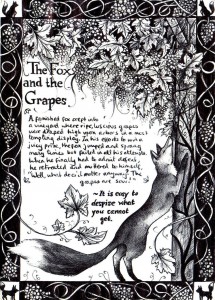A famished fox saw some clusters of ripe black grapes hanging from a trellised vine. She resorted to all her tricks to get at them, but wearied herself in vain, for she could not reach them. At last she turned away, hiding her disappointment and saying: “The Grapes are sour, and not ripe as I thought.”
—Aesop, traditional fable, The Fox and the Grapes
The fox in this fable is very motivated to get her hands on some deliciously looking grapes. Unfortunately, she cannot reach them… In the end she turns her back to the grapes and comforts herself by thinking that they are not so ripe or desirable anyway.
Like the fox in the fable, if motivated, people bring judgments of desirability in line with judgments of likelihood. (How likely is it that a desired object is obtainable? How big is the chance of getting something and hence, how much do I want it?) A great article on this phenomenon is “Sour Grapes, Sweet Lemons, and the Anticipatory Rationalization of the Status Quo”.
The thought mechanism behind the sour grapes is clear from the fable above (even appealing things can be considered as uninteresting, if they are unobtainable anyway). The reasoning around the sweet lemons works the other way around:
If only lemons seem to be available, you’d rather perceive them to be sweet, desirable. Or in other words, it is better to make the best out of given things/ facts.
“People are remarkably able and willing to adapt to whatever is likely to transpire, so that they begin rationalizing the status quo even before it becomes reality.”

